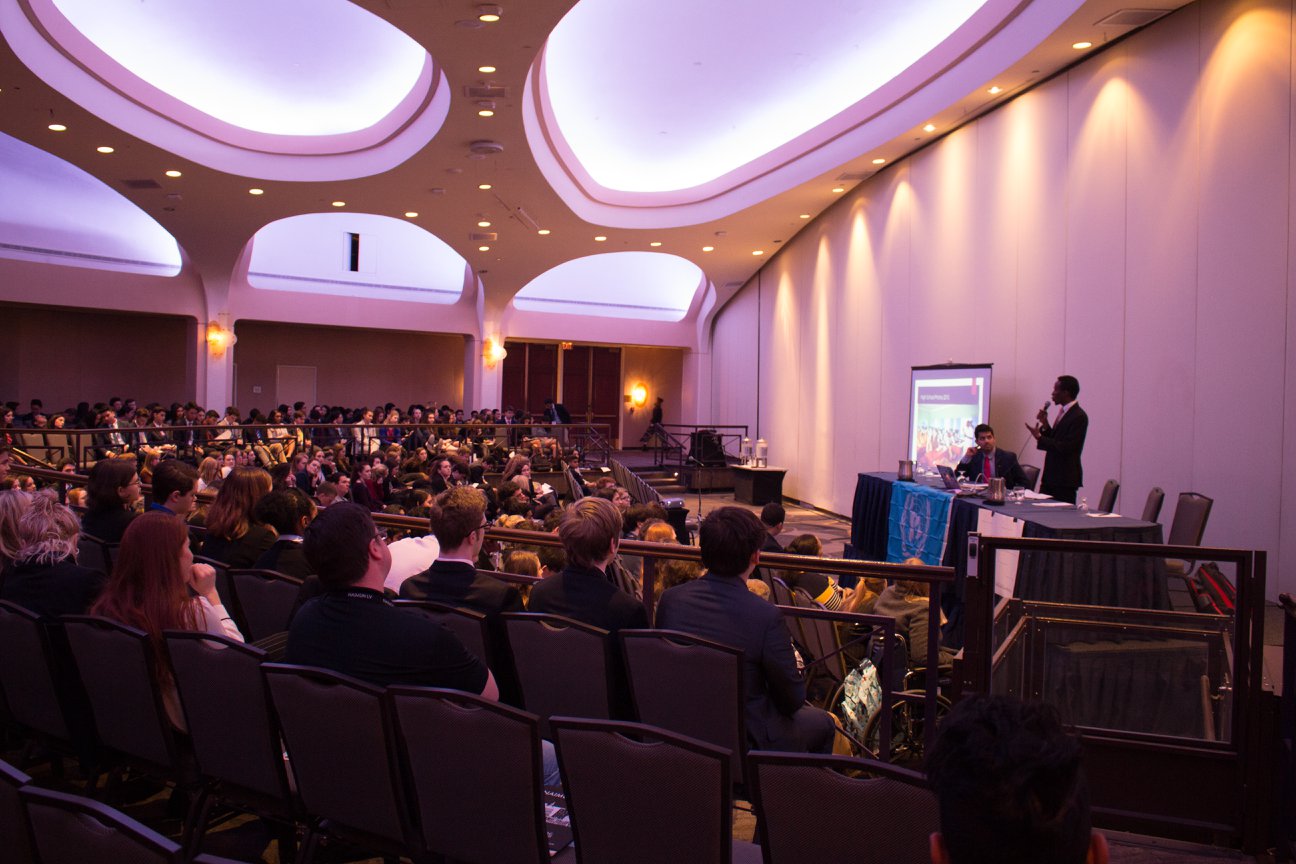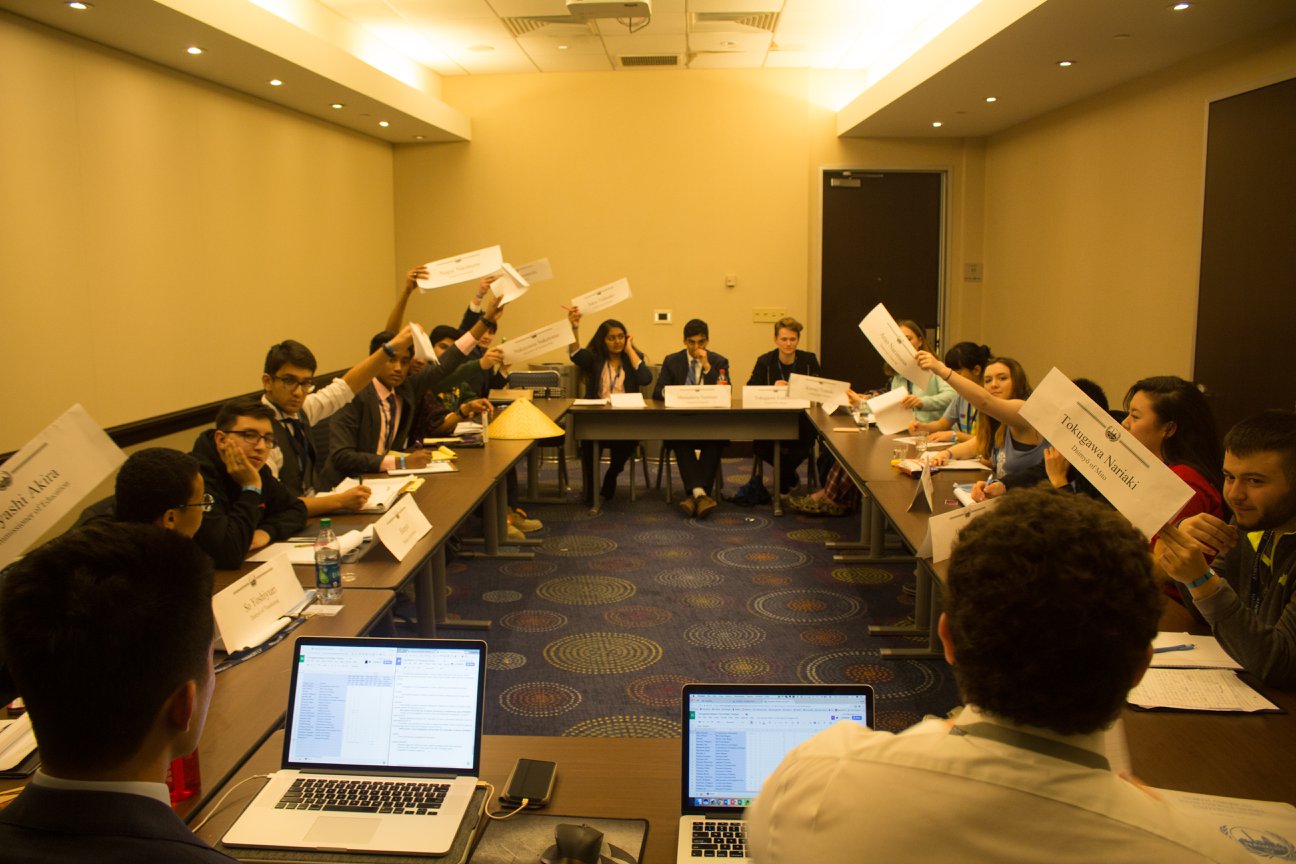This guest article was written by Chase Wagers, a junior at Georgetown University and the Secretary-General of NAIMUN LVI.
After more than a decade, the 56th North American Invitational Model United Nations Conference (NAIMUN LVI) is bringing back the Ad-Hoc Committee of the Secretary-General. As NAIMUN is de facto championship conference on the high school circuit, it’s only fitting that there should also be a de facto championship for crisis committees: the Ad-Hoc.
NAIMUN is run by the Georgetown International Relations Association and the 56th conference will be held from February 14th-17th, 2019. NAIMUN is known for its core educational values which provide delegates the opportunity to engage with global issues and learn about new perspectives. Through 39 wide-ranging committees, NAIMUN challenges over 3,000 high school students from around the world to immerse themselves in spirited debate regarding the world’s most pressing issues.

NAIMUN 2018 committee session
In general, crisis committees have become increasingly popular on the general high school circuit, following the trend seen in the college circuit, as both delegates and secretariat have found value in these fast-paced simulations that provide each delegate with an unexpected and formative experience at the end of the conference. Though General Assemblies and Economic and Social Councils (ECOSOCs) are still the foundation of Model UN, staying true to its roots as a simulation of the United Nation, crisis committees push these foundational skills to the next level. Specifically, Ad-Hoc Committees require delegates to take skills of leading, speaking, and writing, and implement and improve upon them in the most unexpected and fascinating scenarios.
As Chair Suraag Srinivas explains, “The traditional Ad-Hoc Committee structure was conceived as a way to test the skills of the best delegates at a conference by removing the opportunity to do extensive research and instead challenging delegates with a topic presented on the spot.” The Ad-Hoc committee structure requires successful delegates to be not only knowledgeable about a vast array of topics in international affairs and history but also creative, spontaneous, and confident. Delegates will learn to to tackle crisis situations even with minimal knowledge on the topic.
While this Ad-Hoc Committee will challenge delegates to make decisions with limited preparation, Srinivas and Crisis Manager Margaret Hodson have planned the release of certain clues which will provide delegates the opportunity to begin using their analytical and critical thinking skills even before the conference is gaveled in.
According to the Chair and Crisis Manager, these clues will give delegates “small insights into segments of the committee, from a geographic region to hints towards individual portfolio powers. Delegates who decipher these clues give themselves the opportunity to research and prepare for aspects of the committee.” Through the release of clues, Srinivas and Hodson hope to encourage and develop creative thinking, problem-solving skills, and a knowledge of a topic not traditionally taught in school.
So far, feedback from moderators and head delegates on the Ad-Hoc Committee and its build-up has been positive. Schools are excited to see how NAIMUN continues to challenge their delegates and ultimately provide formative educational experiences.

A crisis committee session at NAIMUN 2018
Under-Secretary-General of Cabinets, Siddharth Muchhal, noted the importance of the Ad-hoc experience for delegates. “Crisis committees in Model UN are meant to be a simulation of real-world crises, where leaders often don’t have the opportunity to sit down and research a crisis before it arises. They have to work with what they know, and often work past divides to create consensus with colleagues and make timely responses. I’m confident this committee will be a unique, engaging, and enjoyable experience for everyone involved.”
The reintroduction of the Ad-Hoc Committee highlights a larger trend of innovation within the conference, reflecting the changing high school circuit. Along with the addition of the Ad-Hoc Committee, the NAIMUN Cabinets Organ will also be reintroducing the JCC structure, this time focused on the Spain-Catalonia regional conflict. NAIMUN will also be expanding their National Security Apparatus Organ to include intelligence branches from multiple countries and will be introducing the Book Award as a way to recognize delegates for their exceptional research and substantive debate.
Overall, the Ad-Hoc Committee of the Secretary-General at NAIMUN LVI will be an unparalleled educational experience for the world’s best crisis delegates, and will continue the trend of dynamic innovation on the high school Model UN circuit. For more information on NAIMUN, please visit naimun.modelun.org or e-mail naimunsg@modelun.org

